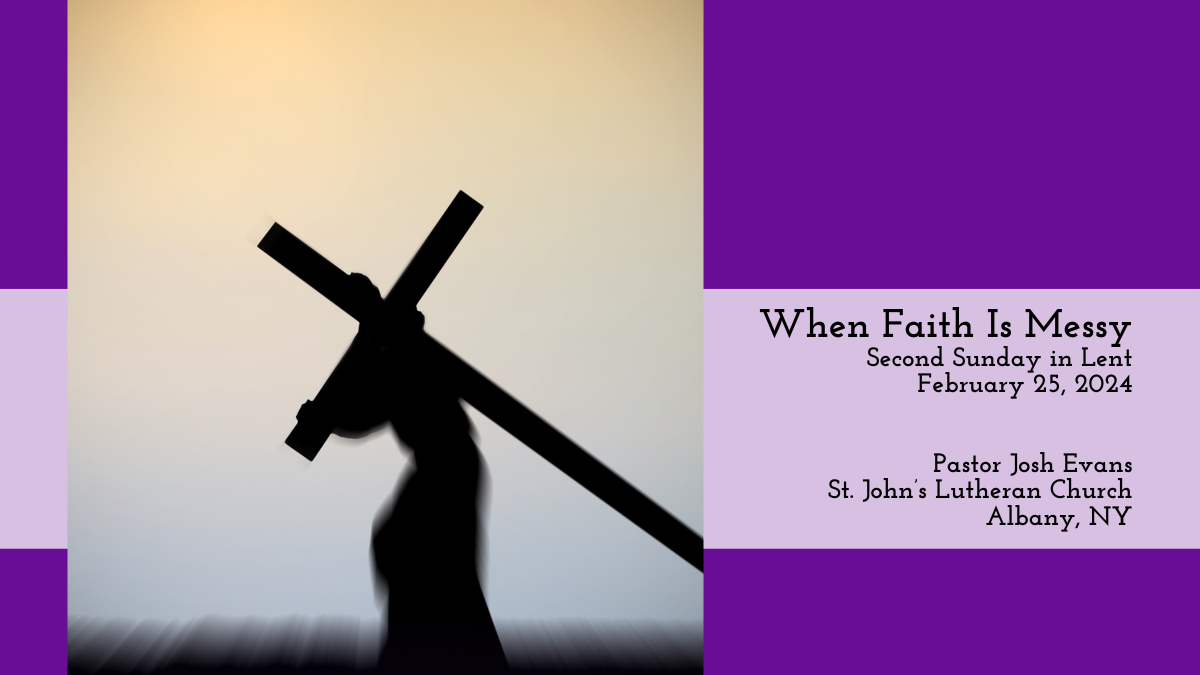St. John’s Lutheran Church
25 February 2024 + Lent 2b
Mark 8:31-38; Gen. 17:1-7, 15-16
Rev. Josh Evans
Life is messy … so why would we expect the life of faith to be any different?
Abraham, later exalted by Paul as the pinnacle of faith, was far from perfect. From the beginning of his call, when he was still Abram, a severe famine forced him and his wife Sarai to Egypt for survival. Almost as soon as God calls him, Abram distrusts God’s promises and lies to Pharaoh, saying that Sarai is his sister, in order to spare his own life.
Later, after God reiterates the divine promise to Abram and Sarai that they will indeed have children, still they distrust God. At that point, Sarai takes matters into her own hands and tells her husband to sleep with her slave Hagar to give them a son.
Centuries later, Abraham and Sarah would find good company with the disciple Peter, the patron saint of putting one’s foot in one’s mouth. Almost in the same breath as Peter boldly and bravely declares Jesus to be the Messiah, he tries to get in the way of the work of that Messiah. And then there’s the seemingly harsh response leveled directly at him: “Get behind me, Satan!”
Later, on the mount of transfiguration, it’s Peter who will suggest building three tents so they can all camp out and stay … only to be met with another divine rebuke. Poor Peter just can’t catch a break. And surely we can’t forget his triple denial of ever even knowing Jesus.
And yet, even in spite of their shortcomings and failures: God is faithful.
Abraham goes on to be the father of many nations. And Peter, witness to the resurrection, is the rock on which Christ builds his church.
Did God screw up by calling such imperfect people as Abraham and Peter? Or maybe, did God know exactly what God was doing?
Maybe, God is trying to tell us something about the messy life of faith. Maybe, God is showing us that God can use messy and messed up people because God, who is faithful, calls them.
“The opposite of faith is not doubt, but certainty,” as Anne Lamott has famously written. Faith doesn’t mean having all the answers or having a perfect track record. Faith is full of doubts and questions and uncertainty. And in many ways, that’s a lot more faith-full than total and unflinching assent to a set of beliefs or doctrine.
“If any want to become my followers, let them deny themselves and take up their cross and follow me.” Jesus’s call to discipleship is not a call to blindly follow and to ignore suffering. “Taking up our cross” is also certainly not a justification for enduring suffering or abuse, as it has so often been misused.
Taking up our cross, as Jesus calls us, is to embark on a life of faith that is going to be challenging and uncertain and full of questions and missteps.
Taking up our cross calls us into a messy faith.
Indeed, taking up our cross calls us to a faith that stands where Jesus did – at the very center of the world’s pain – alongside those like sixteen-year-old Nex Benedict, in Owasso, Oklahoma, as they were bullied and attacked in the bathroom at their school, just for being and expressing who they are, and who died the very next day.
Taking up our cross calls us to a faith that beholds the very image of God in those who suffer and cry out under the suffocating oppression of racism and sexism, homophobia and transphobia, depression, addiction, and abuse.
This is a faith that is not afraid to get its hands messy, to dig into the muck and mire, and to reach out in love.
The life of faith is messy.
And it will probably leave us with more questions than answers. But it’s a life that is no less faith-full to the one who calls us, who sustains us, who washes us in the waters of baptism, who nourishes us with bread and cup.
We yearn for life to be easy. We yearn for a sanitized faith with a perfect track record.
But that’s not what faith is about … and there’s some grace in that too. There’s a lot of grace in that, actually.
Because it is in our doubts and questions and missteps that God calls us anyway, flaws and all:
The God of Abraham, the patriarch of Israel, who doubted and lied.
The God of Sarah who laughed in the face of God’s promises that seemed too good to be true.
The God of Peter who didn’t – or couldn’t – understand what it meant for Jesus to be the Messiah.
The God of us, imperfect and flawed as we are, but no less beloved members of God’s family.
We are in good company with our fellow messed-up ancestors in faith. We are in good, messy company with each other.
If we wait until we have it all together to do the work of the gospel, until circumstances are just right, until ____ (what?) … then we’re going to be waiting for a very long time.
Jesus calls us to start now. As we are. With the gifts we bring. The experiences we have. The lives we live.
Let us now and ever walk with Jesus because it is God who calls us, God who makes an unbreakable covenant-promise with us, God who equips us, and God who sustains us.
Let us ever walk with Jesus now – for the sake of the gospel and for the sake of a hurting world in need of God’s justice-making love.


